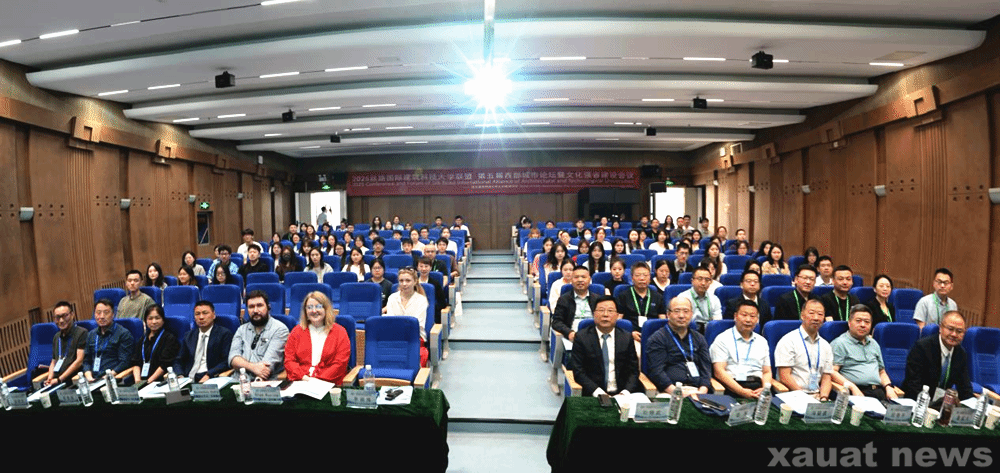During the 2025 Conference of SRIAATU, the 5th Western Cities Forum & Conference on Building a Culturally Advanced Province was held at the Yanta Campus of Xi’an University of Architecture and Technology (XAUAT) on May 17. Liu Xiaowu, Vice President of XAUAT, attended and addressed the meeting.
Present at the meeting were experts and scholars from over 40 universities, including Moscow State University of Civil Engineering (MGSU), Saint Petersburg State University of Architecture and Civil Engineering (SPbGASU), Kyrgyz State Technical University (KSTU) and Peking University, as well as the faculty members of XAUAT School of Public Administration.
In his speech, Liu Xiaowu extended congratulations on the convening of the meeting and welcome to the guests from China and abroad. He hoped the meeting would serve as an open and inclusive academic platform to pool wisdom of the Chinese and foreign scholars by sharing their insights and proposing forward-looking, practical and innovative solutions, and to provide theoretical support for the modernization of urban governance in western China and the building of Shaanxi into a culturally advanced province.
Olga Kuzina, Vice Rector of MGSU, said in her speech that since its establishment, the China-Russia Alliance of Architectural and Technological Universities has carried out fruitful cooperation in fields such as smart city and green building. As this forum provided a new platform to deepen bilateral exchanges, she looked forward to the implementation of more programs of practical cooperation.
Zhan Shaowen, Dean of XAUAT School of Public Administration, made remarks on behalf of the organizer of the meeting. He hoped all sides would take the meeting as an opportunity to further deepen exchanges and cooperation among universities and countries in fields such as urban governance and promotion of culture, so as to make joint contribution to promoting high-quality development of cities in western China and building a culturally advanced province.
Keynote speeches at the first session included “Integration Mechanisms of Metropolitan Areas Based on Borrowing Scale” by Professor Lu Jun from Peking University, “Application of Artificial Intelligence in Curriculum Design for Architectural Design Disciplines” by Professor Surovenkov Andrei from SPbGASU, “Typical Models-Institutions-Power Dynamics in Cross-Provincial Spatial Governance” by Professor Kuai Yanli from Renmin University of China, and “Comprehensive Rule of Law and Modernization of National Governance” by Professor Feng Liujian from Beijing Normal University.
Four other keynote speeches were made at the second session, including “The Role of Big Data and AI in the Adaptation of Urban Planning Systems to High-Tech Urbanization Conditions” by Associate Professor Sasykeev Ulanbek from KSTU, “The Mechanism and Model of All-Around Land Rearrangement Promoting Urban-Rural Integration” by Professor Jin Xiaobin from Nanjing University, “Enhancing Grassroots Emergency Management Capabilities: A Study on Influencing Factors of Community Emergency Management in Megacities under the Empowerment of Digital Intelligence Technologies” by Professor She Shuo from Huazhong University of Science and Technology, and “Digital Empowerment for Comprehensive Rural Revitalization” by Professor Tian Yanping from Zhongnan University of Economics and Law.
The participants also exchanged views at five parallel forums under themes of urban-rural integration & coordinated governance, smart city & governance innovation, urban renewal & resilient governance, building a culturally advanced province, and the development of the major of urban management.
The meeting not only provided a platform for the exchange of insights for Chinese and foreign scholars, but also focused on the challenges in the urban development in western China, providing theoretical support and practical solutions for the modernization of regional governance and the building of a culturally advanced province.
